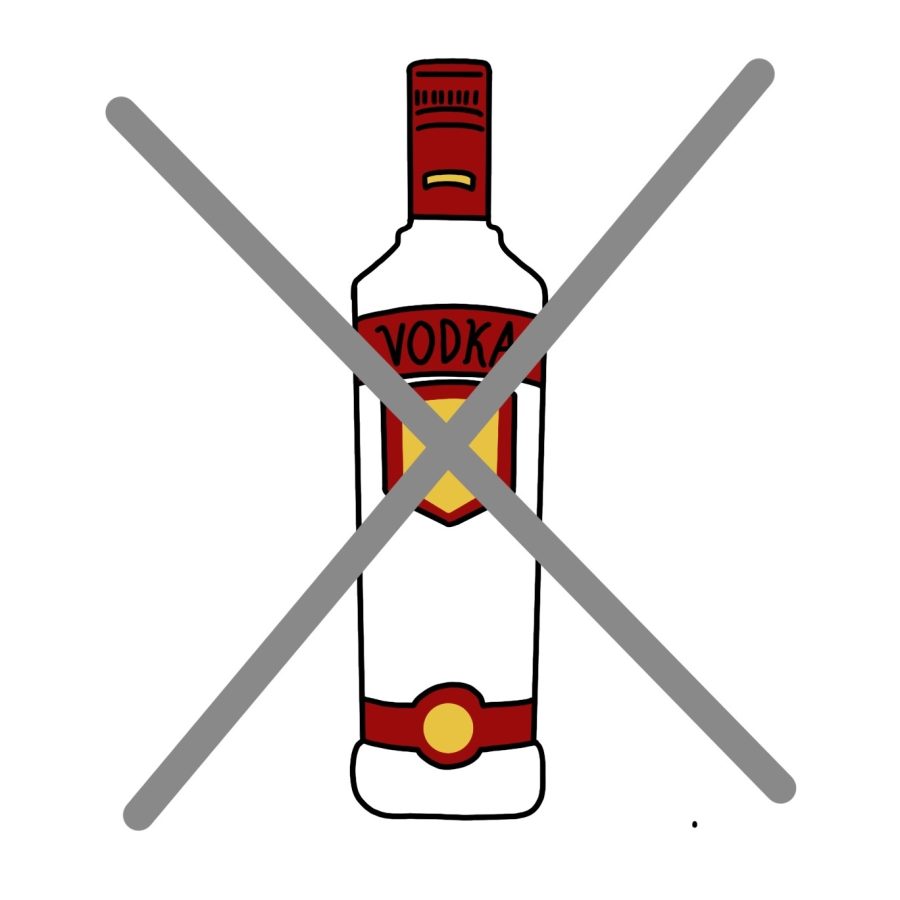Op-ed: We must stop technological exports while avoiding a complete ban on Russian products
The United States must avoid getting into a war while still taking a stand against Russia.
April 19, 2022
President Joe Biden recently tweeted, “Our European, American, British colleagues will not stop and will not calm down until they have exhausted all their possibilities for the so-called punishment of Russia.” The United States has continued the imposition of sanctions on Russia as its war crimes in Ukraine have become more gruesome. Russia’s trade status was recently revoked by the U.S. Congress, and Massachusetts State Rep. Patrick J. Kearney introduced a bill to ban Russian products imports from the entire state. This was the inevitable outcome of Russia’s actions, and NATO has made it clear there would be a price Russia would have to pay since Russian President Vladimir Putin announced a long-dreaded “special military action” in Ukraine.
Since the possibility of a war could be lethal, the United States is trying to prevent entering into the war with Russia, while working against Russia in other ways. According to a Associated Press-NORC poll, 72% said the United States should play a minor role in the Russia-Ukraine conflict. While Ukraine has been fighting actively against Russian army, Western countries led by the United States chose to apply sanctions on the country.
Strategically, sanctions are the safest way to put the United States out of escalating war tension. The national trade ban, carried out by the embargo bill passed by Congress unanimously on April 7, only includes higher tariffs on Russian products. Previous bans from the United States mainly targeted investment, Russian government officials, and enterprises exported to Russia. This has cracked Russia’s economy. According to the Institute of International Finance, the current crisis will wipe out 15 years of economic development for Russia.
Despite the benefits of these sanctions, what Kearney has been proposing does not fulfill the original purpose of the national sanctions. Kearney introduced a bill that would ban every Russian-made product in the state of Massachusetts, giving himself credit for introducing the bill that was getting “excellent feedback.” Vodka naturally became the target, and it’s soon moved away from the shelf by multiple grocery stores, for example, BazaAr Supermarkets.
Merchants have the right to make their own choice of what to do with their products. When it comes to individual merchant’s choice, BazaAr Supermarkets stopped stocking products imported from Russia, it’s reasonable for them to do so in a show of support to Ukrainian people as the owners’ ethnicity is Ukrainian. Banning vodka is more symbolic, as alcohol consumption is a minor part of one’s daily life. When it comes to Kearney imposing a flat-out ban on Russian products and businesses owned by Russian immigrants who have been living here for many years, he deviated from the purpose of sanctions, which should be supporting democracy. Those Russian property owners are not necessarily war supporters, but now the compulsory bill is compromising their property rights.
Selling Russian goods that are already in stock does not mean one is supporting Russia’s economy, as they are already properties of American merchants. Cutting trading routes between the United States and Russia will result in Russia’s economic decline on a large scale. Over-politicized proposals will achieve the goal of politicians like Kearney, coming with undermined domestic economic benefits and civil rights protection.
Massachusetts is one of the most active Ukraine-supporting states. Massachusetts Institute of Technology ended a decade-long technological collaboration with the Russian Skolkovo Foundation on. The partnership between MIT and the Russian research institute has benefited both sides economically, and it was not interrupted even by the expulsion of Skolkovo leader Victor Vekselberg. The FBI couldn’t break the ties of interest between them even in the agency’s political investigation in 2019.Cutting the tie of interest isn’t easy but is necessary under this special circumstance.
Before the war, FBI investigation couldn’t prove this technology cooperation was helping Russia develop their technology inappropriately, not convincing enough to stop the mutual benefits brought by technology cooperation, at least. Unfortunately, when the Russian government crossed the line and kept their autocracy, technology sharing had to be stopped to prevent the Russian government from taking advantage of them. A radical ban on Russian products should not be encouraged for this is not supporting democracy anywhere. Today, cutting-edge technology becomes the key for Russia to start destructive warfare in Ukraine. Technology partnership termination is necessary even though it makes scientists’ efforts in vain as the price we have to pay for the democracy and security of Ukrainians.
Tim Zhao is a first-year journalism and political science combined major. He can be reached at zhao.shengh@northeastern.edu.







